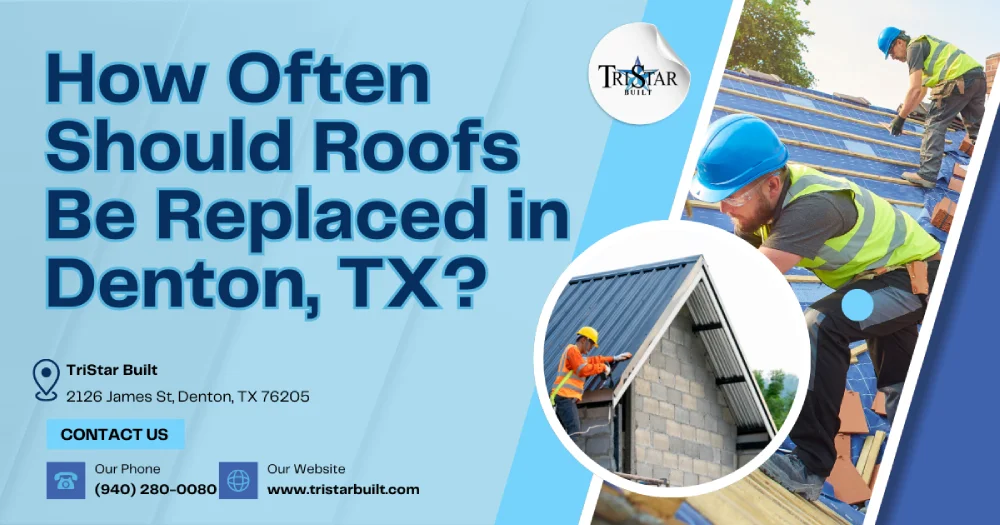
Replacing a roof is a major decision for homeowners and business owners in Denton, TX. Over time, roofs endure weather extremes, debris, and natural aging that can compromise their structural integrity and energy efficiency. This article examines roof lifespans in Denton, the factors that impact durability, visible signs of damage, and cost and contractor considerations. Readers will gain practical guidelines on roof maintenance and replacement that help protect their investment while ensuring safety and efficiency.
Roof lifespans in Denton depend on the materials used, installation quality, and local climate. Generally, roofs last between 15 and 50 years if maintained properly. Traditional asphalt shingles usually last 20 to 30 years, while premium materials like metal or tile can exceed 40 years.
Factors such as temperature fluctuations, high UV exposure, and hail storms may accelerate deterioration. A properly installed roof with quality underlayment, ventilation, and flashing delays common problems like leaks and wood rot. Local contractors recommend regular inspections and maintenance—such as clearing debris and addressing minor shingle wear early—to help extend a roof’s lifespan and improve energy efficiency.
Different materials vary in lifespan and durability. Asphalt shingles, popular for their cost-effectiveness, typically last 15 to 30 years but are vulnerable to extreme weather. In contrast, metal roofs can last 40 to 70 years due to their resistance to corrosion, wind, and fire.
Tile roofs (clay or concrete) are known for longevity, often exceeding 50 years, while slate roofs can last up to 100 years though they are usually reserved for high-end or historic buildings. Homeowners in Denton should balance initial cost with long-term benefits such as lower maintenance and energy savings, while keeping in mind that no one material suits every situation.
Denton’s climate heavily influences roof durability. Hot summers, significant temperature swings, and severe weather, including hail, impose stress that can cause expansion, contraction, and cracking. UV exposure degrades asphalt shingles, reducing their water resistance over time.
High humidity and heavy rains may lead to mold growth and wood rot if ventilation is poor, and sudden hail can cause immediate physical damage. Because these factors often work together, regular inspections—especially after severe storms—are essential to detect and repair small issues before they become major problems.
Routine roof maintenance is key to extending a roof’s life. Regular cleaning, inspections, and minor repairs prevent minor issues from escalating into full-blown failures. Tasks such as removing debris, cleaning gutters, and checking for loose or damaged shingles help prevent water accumulation and structural damage.
Maintaining proper ventilation and insulation can reduce heat buildup and stress on roofing materials. Many contractors suggest biannual check-ups in spring and fall to prepare for seasonal changes. Overall, proactive maintenance not only protects the home but also enhances the roof’s energy efficiency and property value.
Identifying the need for roof replacement early can prevent extensive damage and high repair costs. Common warning signs include missing, curled, or cracked shingles; persistent leaks; and noticeable sagging. In Denton, severe weather accelerates these issues, making prompt evaluation important.
Additional signs include granule loss on asphalt shingles (evidenced by debris in gutters), dark streaks on ceilings, and water stains in the attic. If repairs become frequent or the roof nears the end of its expected lifespan—typically 20 to 30 years for asphalt—the cost-effectiveness of replacement often outweighs continued patchwork repairs.
Visual cues of roof damage include:
Other indicators may be damaged flashing or gutters and the presence of moss or mold, suggesting trapped moisture and inadequate ventilation. Even minor, isolated damage should be promptly addressed to avoid more severe problems in the future.
Deciding whether to repair or replace a roof depends on the extent and spread of damage. Localized issues such as a few missing shingles or minor leaks may be effectively fixed through repairs. However, if damage is widespread, if the roof is over 25 years old, or if repairs become frequent, a full replacement is typically advisable.
Repairing can be cost-effective short term but may lead to higher long-term costs and poor energy efficiency if the roof’s overall condition is deteriorating. Consulting a professional contractor for an in-depth evaluation will help determine the most appropriate solution in terms of both safety and investment value.
Routine roof inspections are crucial for early detection of potential problems. Annual or biannual inspections—especially after major weather events—can uncover issues like loose flashing, damaged shingles, or early water leakage before they escalate.
Professional inspections assess the roof’s ventilation, underlayment, and overall condition, providing detailed recommendations. Keeping an inspection record can assist in planning future maintenance or replacement decisions, ultimately saving homeowners from costly emergency repairs and extending the roof’s life.
(Repeat key indicators discussed: missing shingles, leaks, granule loss, and sagging. These signs underscore the importance of early detection.)
Roof replacement cost in Denton depends on material choice, roof size and pitch, labor rates, and the extent of existing damage. On average, a complete roof replacement costs between $5,000 and $15,000.
Material cost is a major budget component: asphalt shingles are typically the most affordable, whereas materials like slate or metal are pricier but offer longer durability. Additional costs may include removal of the old roof, structural repairs, and enhanced ventilation systems. Homeowners are advised to obtain multiple quotes and consider financing options such as home improvement loans, personal loans, or specialized contractor financing to manage the expense effectively.
Several factors affect replacement pricing:
Seasonal discounts or off-peak scheduling can sometimes reduce overall costs. Transparent, detailed estimates can help homeowners prepare financially for the project.
Cost comparisons reveal significant differences in both initial investment and long-term value. Generally:
While asphalt is the most economical upfront, its maintenance needs can add over time. Metal and tile often justify their higher initial costs with durability and lower maintenance requirements.
Below is a summary table:
| Roofing Material | Cost per Sq Ft | Lifespan | Benefits |
| Asphalt Shingles | $3 – $5 | 20 – 30 years | Affordable, easy installation |
| Metal Roofing | $7 – $12 | 40 – 70 years | Durable, energy efficient |
| Tile Roofing | $10 – $15 | 50+ years | Long-lasting, aesthetic appeal |
| Slate Roofing | $15 – $30 | 75 – 100 years | Exceptional durability, prestige |
| Wood Shingles | $5 – $8 | 20 – 25 years | Natural look, insulation benefits |
Roof replacement can be financed through several avenues:
Comparing financing plans from banks, credit unions, and contractors can help homeowners secure favorable terms. Additionally, potential tax deductions or energy efficiency incentives may be available for certain roofing systems.
Selecting a qualified roofing contractor is crucial for safe, effective roof replacement or repair. Homeowners should research contractor credentials, including licensing, insurance, and customer testimonials. A reputable contractor will offer comprehensive warranties, detailed written estimates, and have a proven track record in local projects.
Ensuring the contractor is licensed and insured protects both parties from unforeseen liabilities. In Denton, local experience is valuable as contractors will be familiar with regional weather challenges and building codes.
A dependable roofing contractor must have a valid state license and proper insurance, including liability and workers’ compensation. Homeowners should always ask to see these documents, as lapses may indicate substandard work or legal risks. Contractors who stay current with industry training and certifications are more likely to follow best practices and ensure project safety.
Customer reviews and testimonials provide insight into a contractor’s reliability and work quality. Look for consistent references to professionalism, punctuality, and effective post-installation support. Direct feedback from past clients can confirm whether the contractor meets industry standards and offers good customer service—key factors for a stress-free roofing project.
Before hiring a contractor, ask:
Clear answers help ensure transparency and protect against hidden costs or future disputes.
Regular roof maintenance is essential in Denton. Homeowners should set up a schedule for cleaning, inspections, and timely repairs to maintain both appearance and functionality. Proactive care not only extends a roof’s life but also improves energy efficiency and safeguards against weather-induced damage.
Key practices include:
Such measures can significantly delay the need for a full roof replacement while preserving home value.
It is recommended that roof inspections in Denton occur at least twice a year—once in the spring and once in the fall—and after any major weather events. Regular check-ups help identify emerging problems before they become costly repairs, ensuring the roof remains in optimal condition year-round.
Effective cleaning involves:
These practices maintain both the aesthetics and integrity of the roof by preventing water buildup and subsequent damage.
Routine maintenance, regular inspections, and prompt minor repairs can greatly extend the lifespan of a roof. By addressing small issues immediately, homeowners reduce the risk of severe damage that would necessitate a full replacement. Preventative practices, including cleaning, trim management, and protective coatings, safeguard the roof while improving energy efficiency and indoor comfort.
Choosing the right roofing material for Denton requires considering durability, cost, aesthetics, and performance in local weather conditions. Materials must withstand high summer temperatures, seasonal storms, and varying climatic challenges. Options include asphalt shingles, metal, tile, and specialized materials suited to regional demands.
Asphalt shingles remain popular due to their affordability and ease of installation. They typically last 20 to 30 years with proper maintenance. Benefits include good fire resistance, noise reduction, and a variety of color choices. Though not as durable as premium options, their cost-effectiveness makes them a common choice in moderate climates.
Metal roofing excels in Denton due to its durability and resistance to harsh weather. With lifespans of 40 to 70 years, metal roofs efficiently reflect solar heat, lowering cooling costs. Although the initial expense is higher than asphalt, the long-term benefits such as low maintenance and superior performance under extreme weather make it an attractive option.
Tile roofing, available in clay or concrete, is known for its durability and distinctive appearance. With lifespans exceeding 50 years, tile roofs provide excellent thermal insulation and reduce indoor temperatures during hot summers. However, their heavier weight may require additional structural support and higher installation costs. Despite these factors, tile roofing remains an appealing investment for homeowners seeking long-term performance and energy efficiency.
The decision to repair or replace a roof is a significant investment that directly affects the safety, efficiency, and value of your property in Denton, TX. By understanding the expected lifespan of various roofing materials, recognizing early signs of damage, and evaluating cost and contractor options carefully, homeowners can make informed choices. Proactive maintenance, regular inspections, and timely repairs are key to extending a roof’s life and preventing costly accidents or failures. With thoughtful planning and the support of qualified professionals, residents can ensure their roofs continue to provide reliable, long-lasting protection.
At least twice a year—typically in spring and fall—and after severe weather events to catch early signs of damage.
Yes; routine cleaning, prompt repairs, and professional inspections can significantly delay the need for full replacement.
Consider the extent of the damage, the roof’s age, and repair costs. If damage is widespread or the roof is near the end of its lifespan, replacement is often safer and more cost-effective.
Material choice affects cost and longevity. While asphalt shingles are more affordable, options like metal or tile offer longer durability and may reduce long-term maintenance costs.
Yes; options include home improvement loans, personal loans, and contractor financing. Low-interest home equity loans or lines of credit can also help manage the expense.
Reliable roofing services prioritize transparency, skilled craftsmanship, and long-term performance. Whether you're working on a new roof, roof repair, or a full-scale commercial roofing project, trustworthy contractors offer clear roofing quotes, quality building material, and dependable warranty coverage. Verified roofers in my area, especially those recognized as better business bureau roofers, are more likely to use durable options like sheet metal, bitumen, or steel to ensure resilience under extreme weather conditions. Exceptional customer service, paired with clean safety records and fall protection adherence, distinguishes top-tier providers from less reputable roofing companies.
When evaluating roofing companies in my area for flat roof installations or flat roof repair, it’s important to review their expertise in both commercial roof and domestic roof construction. Look for contractors who work with long-lasting materials like EPDM rubber, rubber roofing, or green roof systems that are environmentally friendly and energy-efficient. Top-rated contractors from local roofing companies will offer you a free inspection, share verified roofing quotes, and explain long-term roof repair cost implications. Contractors like TriStar Built offer scalable solutions for both small and large-scale roofing projects.
A full-service roofing company should handle everything from initial consultation to post-project support. Services include roof repairs, roof leak repair, material selection (roof shingles, sheet metal, steel), structural basement waterproofing, and even siding upgrades. Reputable companies also provide inventory transparency for materials like lumber, bitumen, and standing seam metal roof components. Whether you need conservatory roof enhancements, a solar system ready installation, or advanced metal roof cost planning, the best companies support you with flexible payment options and strong network relationships across construction trades. Look for consistency in their rating and reviews to ensure you receive reliable, code-compliant service.
A warranty is your safety net against future issues in roofing services. Especially in larger roofing projects, where commercial roofing or custom roof maxx treatments are applied, a solid warranty guarantees peace of mind. High-quality roofing contractors back their work with comprehensive warranties on both materials and labor. Always confirm warranty terms during your initial contact and request them in writing as part of your service agreement.
Hiring local roofers provides faster response times, better site knowledge, and often stronger ties to local supplier inventory for roof shingles, rubber roofing, or bitumen. They understand local construction norms, work with qualified roofing contractors, and use safety practices such as proper ladder protocols and OSHA-approved fall protection. This ensures smoother roofing projects, especially in complex domestic roof construction or commercial roof jobs.


Whether you’re remodeling a home, expanding a business, or starting from the ground up, TriStar Built is here to guide you every step of the way. With a focus on craftsmanship, communication, and results that last, we make the construction process clear, smooth, and worth every investment.

LOCATION: 2126 James Street, Denton, TX 76205
PHONE: (940) 381-2222
© 2025 TRISTAR BUILT - ALL RIGHTS RESERVED | WEB DESIGN & SEO BY: Authority Solutions®